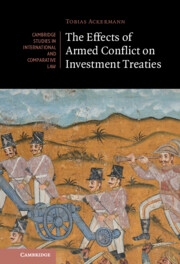Book contents
- The Effects of Armed Conflict on Investment Treaties
- Cambridge Studies in International and Comparative Law: 169
- The Effects of Armed Conflict on Investment Treaties
- Copyright page
- Dedication
- Contents
- Acknowledgements
- Table of Cases
- Table of International Agreements and Documents
- Table of Domestic Instruments and Documents
- Abbreviations
- Introduction
- Part I The Continuity of Investment Treaties
- Part II Investment Protection and the Role of International Humanitarian Law
- Part III Investment Protection Standards during Armed Conflict
- 5 Armed Conflict Clauses
- 6 Full Protection and Security
- 7 Expropriation
- 8 Fair and Equitable Treatment
- Part IV Exceptions and Defences
- Bibliography
- Index
- Cambridge Studies in International and Comparative Law:169
7 - Expropriation
from Part III - Investment Protection Standards during Armed Conflict
Published online by Cambridge University Press: 11 August 2022
- The Effects of Armed Conflict on Investment Treaties
- Cambridge Studies in International and Comparative Law: 169
- The Effects of Armed Conflict on Investment Treaties
- Copyright page
- Dedication
- Contents
- Acknowledgements
- Table of Cases
- Table of International Agreements and Documents
- Table of Domestic Instruments and Documents
- Abbreviations
- Introduction
- Part I The Continuity of Investment Treaties
- Part II Investment Protection and the Role of International Humanitarian Law
- Part III Investment Protection Standards during Armed Conflict
- 5 Armed Conflict Clauses
- 6 Full Protection and Security
- 7 Expropriation
- 8 Fair and Equitable Treatment
- Part IV Exceptions and Defences
- Bibliography
- Index
- Cambridge Studies in International and Comparative Law:169
Summary
Chapter 7 takes the analysis beyond the conduct of hostilities and issues related to physical damage to foreign investments. It addresses the rules on expropriation universally included in investment treaties and analyses them against the backdrop of armed conflict. The chapter shows that the protection from expropriation in times of armed conflict principally follows the same general parameters as in times of peace: investment treaties offer protection from abusive property seizures often observed during armed conflict as well as unreasonable or discriminatory restrictions on the use of property and businesses. When it comes to indirect expropriation, the chapter suggests to follow a mitigated version of the so-called police powers doctrine. While the debate on the delineation between expropriatory measures and non-compensable regulations is not new, the context of armed conflict provides new insights based on domestic and international case law on war-time property restrictions. Armed conflict and the interests involved, the chapter argues, broaden the scope of police powers and increase the state’s leeway in restricting the free enjoyment of property.
Keywords
- Type
- Chapter
- Information
- The Effects of Armed Conflict on Investment Treaties , pp. 174 - 198Publisher: Cambridge University PressPrint publication year: 2022

